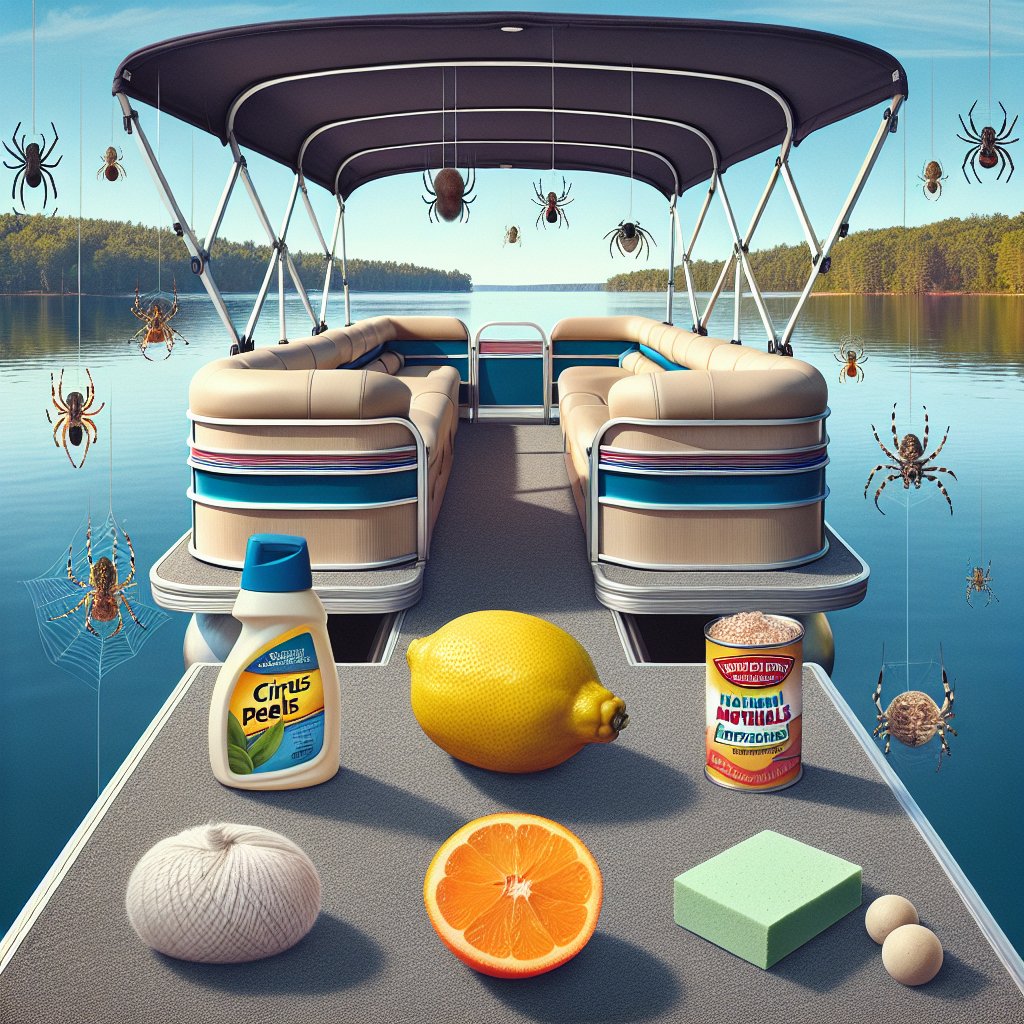Understanding Spider Presence on Pontoon Boats
Spiders are common arachnids that live all around the world. It isn’t uncommon to find them on your pontoon boat, and they can even establish an infestation if left unchecked. Understanding why spiders are attracted to watercrafts is the first step in preventing them from invading your water vessel.
1. Reasons Spiders Are Attracted to Boats
Spiders are attracted to boats because they offer ideal conditions for survival. Boats or pontoons provide spiders with a secure, sheltered environment, and they offer an abundant source of prey, including mosquitoes and other insects that are attracted to the water. Moreover, boats come with a host of dark and cozy nooks that provide ideal nesting sites for spiders.
2. The Life Cycle of Spiders on Watercraft
Spiders are prolific breeders and can lay an astonishing number of eggs during their lifetime. A single female spider can lay more than 200 eggs at a time; these eggs typically hatch in a few weeks, and a new generation of young spiders emerges. So, if spiders have established a presence on your pontoon, it’s critical to act quickly.
3. Potential Risks and Nuisances of Spider Infestations
Spider infestations can pose a host of risks and nuisances for boat owners. For example, while most spiders are not poisonous, some species can cause harm if they bite humans. Additionally, spider webs can obstruct boat engines and damage delicate fixtures, leading to costly repairs and maintenance costs. Understanding the potential risks of spider infestations can motivate boat owners to take action and address the spider problem before it gets out of hand.
Prevention Strategies for Spider Infestations
Pontoon boats are particularly vulnerable to spider infestations given their spacious decks and unobstructed storage areas. Fortunately, there are several preventative measures you can take to keep your pontoon boat spider-free.
1. Regular Cleaning and Maintenance Schedules
Keeping your pontoon boat clean and free of debris is critical in preventing spider infestations. Regular cleaning not only eliminates spider webs, but also removes the prey that spiders feed on.
- Use a soft-bristled brush to scrub the deck area.
- Sweep the deck and compartments frequently.
- Wipe down surfaces with a damp cloth to remove dust and cobwebs.
- Seal all cracks and crevices where spiders can gain entry.
2. Using Natural Deterrents and Repellents
Natural repellents are a cost-effective and safer alternative to chemical treatments.
Citrus and vinegar: Boil a mixture of water, vinegar and lemon and spray the affected areas. Alternatively, wipe the surfaces with lemon juice. The acidic scent repels spiders.
Mint: Crush fresh mint leaves and scatter them around the boat. Spiders find the scent of mint overwhelming, so they tend to avoid the area.
Cedar oil: Cedar oil acts as both an insecticide and repellent. Apply a few drops of cedar oil to cotton balls and place them in strategic locations in your boat.
3. Covering and Protecting the Boat When Not in Use
Spider infestations can occur even when your boat is not in use. Properly storing your boat is critical in preventing spiders from gaining entry.
- Use a tight-fitting boat cover to protect your boat from the elements and keep spiders out.
- Store the boat away from the water. The farther the boat is from a water source, the less likely spiders will find their way inside.
- Place deterrents such as mothballs or cedar blocks around the boat. These scents can make spiders uncomfortable and deter them from entering.
By implementing these preventative measures, you can significantly reduce the risk of spider infestations on your pontoon boat.
Natural and Chemical Solutions for Spider Control
Prevention strategies, no matter how thorough, may still leave you dealing with a spider infestation. Natural and chemical solutions can provide additional measures to keep spiders off your pontoon boat.
1. Homemade Natural Repellents
There are many natural ingredients known to repel spiders, including peppermint oil, vinegar, and citrus. Mixing these ingredients into a spray bottle and applying them to your boat can help keep spiders at bay. Cedarwood chips or blocks placed in strategic locations on your boat can also have a repellent effect.
2. Commercial Spider Repellents Suited for Marine Use
There are many commercial spider repellents available on the market that are specifically suited for use on boats. Look for products that are safe for marine use and contain natural ingredients. These repellents can be applied directly to your boat or used in the form of foggers or traps, depending on the severity of the infestation.
3. Safe Application of Chemical Treatments
If natural and commercial repellents fail, chemical treatments can be used to eliminate spider infestations. However, it’s important to use caution when applying these treatments, as they can be toxic to both humans and pets. Always follow the instructions and use personal protective equipment, like gloves and a respirator, when using chemical treatments.
Ultimately, the best approach to spider control is a multi-pronged strategy that includes prevention, natural repellents, and commercial and chemical treatments. Be persistent and proactive in your approach, and you can keep your pontoon boat spider-free all season long.
Physical Barriers and Tactics
1. Implementing Spider-Proof Boat Covers
Boat covers are an excellent way of preventing spiders from entering your pontoon boat. You can customize your boat cover with materials that are spider-resistant and create a tight seal around the vessel’s edges. A tight-fitting cover will prevent spiders from sneaking in and making your vessel their home. Consider using a heavy-duty tarp or a specially designed boat cover to keep spiders out.
2. Mooring and Docking Strategies to Discourage Spiders
When you are docking your boat or mooring it, tie the ropes in such a way that they do not touch the ground or the water. Ropes touching the ground or water provide a path for spiders and other insects to crawl onto your boat. Additionally, try to dock or moor in well-lit areas, as spiders tend to prefer dark places. Keeping your boat in a well-lit area will reduce the chances of spiders making a home in it.
3. Essential Boat Modifications to Prevent Spider Access
Certain boat modifications can go a long way toward deterring spiders from making their way onto your vessel. One alteration you can make is installing screens on any openings in the boat’s structure, such as ventilation areas or portholes. On-screen windows, you can use a fiberglass screen with a mesh size that can keep even the smallest spiders out. Another modification you can make is to add weatherstripping to the boat’s doors and hatches. Using weatherstripping can create a seal that spiders cannot penetrate.
Using physical barriers and tactics to prevent spiders from entering your pontoon boat is an effective way to keep these unwanted creepy crawlies at bay. Consider implementing strategies such as using spider-proof boat covers, mooring and docking in well-lit areas, and implementing essential boat modifications to prevent spider access. By applying these tips, you can enjoy a spider-free pontoon boat experience.
| Physical Barriers and Tactics | Key Data Points |
|---|---|
| Implementing Spider-Proof Boat Covers | Customize boat cover with spider-resistant materials |
| Create a tight seal around the vessel’s edges | |
| Mooring and Docking Strategies to Discourage Spiders | Tie ropes in a way that they do not touch the ground or the water |
| Dock or moor in well-lit areas | |
| Essential Boat Modifications to Prevent Spider Access | Install screens on any openings in the boat’s structure |
| Add weatherstripping to the boat’s doors and hatches |
Ongoing Maintenance and Monitoring
Effective spider prevention requires regular maintenance and monitoring. Creating a spider-prevention checklist helps ensure no steps are missed.
1. Creating an Effective Spider-Prevention Checklist
Create a checklist that includes routine cleaning, inspection, and repair. Indicate frequency for each task. The checklist may include:
- Inspecting the boat and cleaning it before and after each use
- Removing debris and clutter from the boat regularly
- Checking for cracks or crevices where spiders could hide
- Using natural deterrents or commercial insecticides when necessary
- Storing the boat in a dry, cool, and well-ventilated area
2. Routine Inspections and Cleaning Tips
Spiders can hide in small crevices and spin webs quickly. Routinely inspect the boat for spider webs and sweep them away. You may also consider vacuuming the boat’s interior regularly, paying attention to corners, cracks, and crevices.
Use a mild dishwashing soap solution and warm water when cleaning the boat. Avoid using bleach or harsh chemicals that could damage the boat’s surfaces or harm its occupants.
3. Staying Informed: Latest Products and Practices for Spider Control
Stay informed of the best spider-prevention practices by researching the latest products and techniques. Consult with boating experts, spider-control professionals, and online resources for tips and strategies. Be open to new ideas and methods, and don’t hesitate to adjust your checklist as needed.
Frequently Asked Questions:
1. What attracts spiders to pontoon boats?
Spiders are attracted to boats because their surfaces collect moisture, which supports insect life. Insects make for attractive spider prey. Additionally, boats often offer dark hiding places for spiders to spin their webs.
2. Can spiders on boats be dangerous?
Most spiders are not dangerous. However, some may cause allergic reactions if bitten. Black widows and brown recluses are some of the spider species to watch for. Monitor any spider bites and seek medical attention if necessary.
3. Can I use natural spider deterrents on my boat?
Natural spider deterrents like peppermint oil, vinegar, and citrus can be used on boats. However, note that some essential oils can damage synthetic materials. Be sure to use safe, non-toxic products as well as commercial insecticides on the boat’s surfaces.






